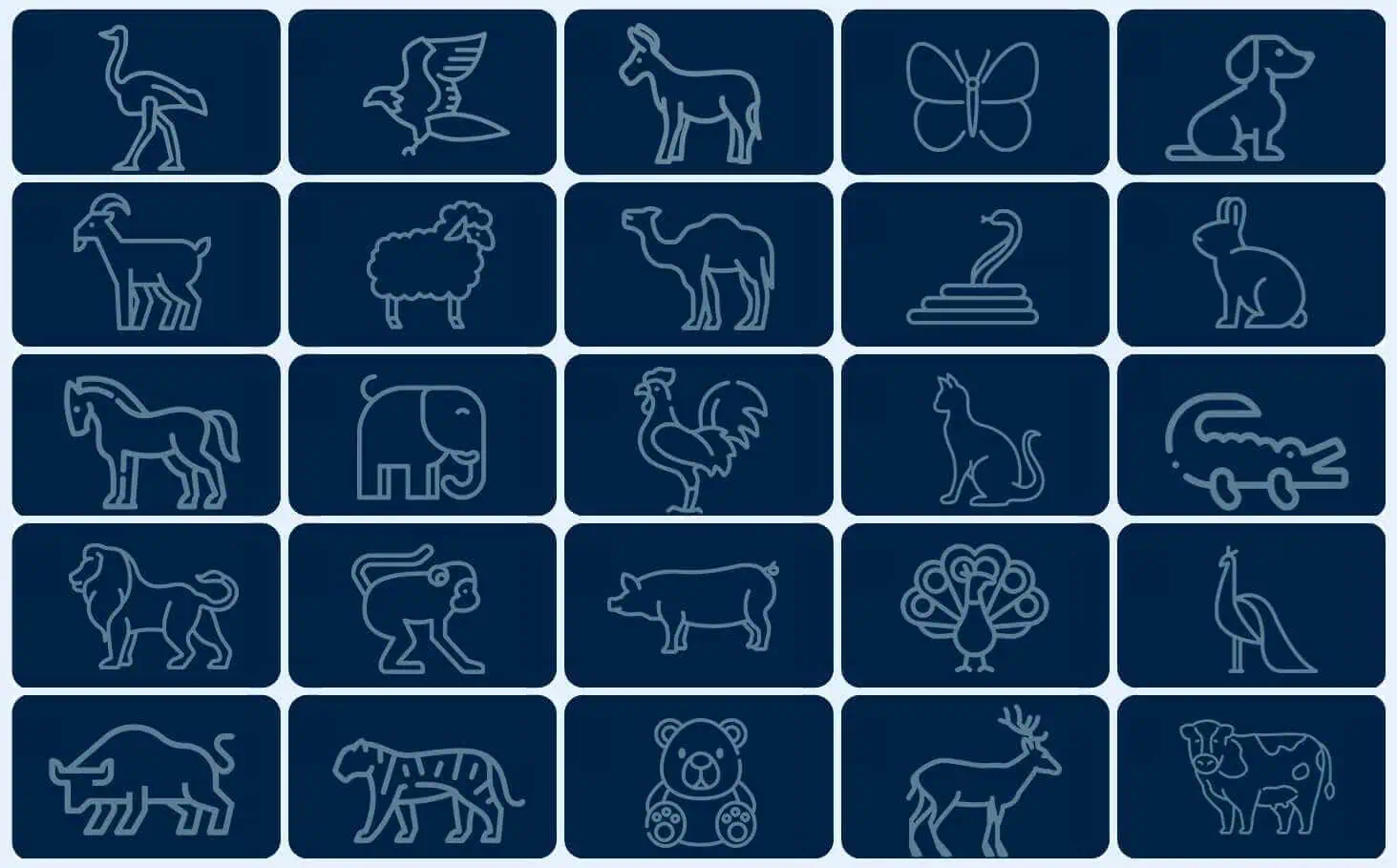This post is also available in:
Jogo do bicho was created in 1892 to fund the City Zoo in Rio de Janeiro. Despite being illegal for long periods of time, this particular kind of lottery has a cultural resilience which makes it one of the most popular real-money games in Brazil to this day.
In over 130 years since its invention jogo do bicho has become a true phenomenon, as Brazilians engage almost daily with this gaming classic. The fusion of legal, economic, social and cultural elements makes it even more exciting to analyze, follow the evolution and present the modern online versions of the “animal lottery.”
This study will therefore focus on the factors which have shaped and which impact the current status of jogo do bicho in Brazil. The aim is providing insights into the shift from the clandestine market to legitimate online casino games, emerging as a valid and legal alternative for Brazilian jogo do bicho fans.
Key Takeaways
- Jogo do bicho is still the fourth most favored real-money game in Brazil.
- The states where jogo do bicho is more popular are Pará, Bahia, Pernambuco, Rio Grande do Sul, Espírito Santo and Rio de Janeiro.
- Most jogo do bicho players are female – 54%.
- The largest age group – 29.4% – consists of players between 35 and 44 years old.
- Today’s jogo do bicho players are middle class, with 46% of them in B2 and 25% in C1 socioeconomic classes. That marks a sharp difference from the past, when it was deemed as a “poor people’s lottery”.
- If regulated, jogo do bicho is estimated to generate around R$30 billion per year in taxes.
Methodology
This study relies on a literature review of historical, cultural, socioeconomic and legal aspects of jogo do bicho in Brazil. It departs from that base to analyze primary ENV Media research on sports betting and players’ profile. Lastly, jogo do bicho online demand is assessed through Google Trends and professional SEO tools like Mangools.
Jogo do bicho – Still Unregulated Yet Popular
In 2022, the Senate Commission on the Constitution and Justice (CCJ) formally approved Bill 2234/2022 that aims to legalize jogo do bicho, land casinos and bingo halls. The legislation was scheduled for a vote after the October 2024 municipal elections but keeps being postponed.
While it remains unregulated, jogo do bicho also remains extremely popular, ranking as the fourth most favored real-money game among Brazilian gamblers, according to our gambler profile study.
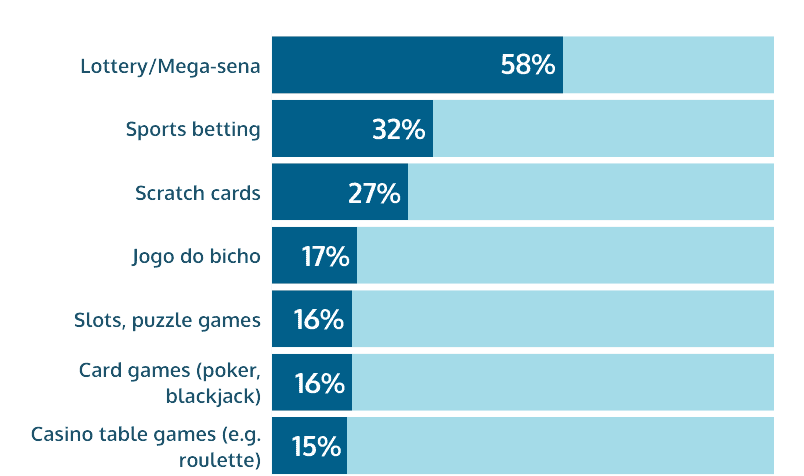
Source: ENV Media
In 2012, through further analysis of the 2008 Household Budget Survey (POF), the Brazilian Institute of Geography and Statistics (IBGE) estimated that – second only to Mega-Sena in terms of revenue that year – jogo do bicho generated approximately R$ 571 million. In this period, jogo do bicho accounted for 14% of Brazilians’ spending on betting, also according to IBGE.
As in 2008, the IBGE 2018 POF included spending on Caixa Econômica’s lotteries, in raffles and illegal categories such as bingo and jogo do bicho. Despite not updating income from jogo do bicho and bingo, the 2018 IBGE assessment of family consumption found that Brazilians spent an average of R$10.08 per month on gambling.
However, families in classes D and E spent around half this amount, while classes A and B gambled almost three times more. Although these figures may be underestimated given the formal illegality of jogo do bicho and bingo halls, the Brazilian population spent an average of 0.17% of their monthly income on gambling in 2018.
Also in 2018, and arguing for the regulation of physical gambling, Fundação Getúlio Vargas professor Pedro Trengrouse projected that, if authorized, jogo do bicho is capable of accounting for R$30 billion in taxes.
According to Google Trends, the highest volume of searches related to the key-word jogo do bicho during the trimester of August, September and October 2024 was prominently distributed among the states of Pará, Bahia, Pernambuco, Rio Grande do Sul, Espírito Santo and Rio de Janeiro.
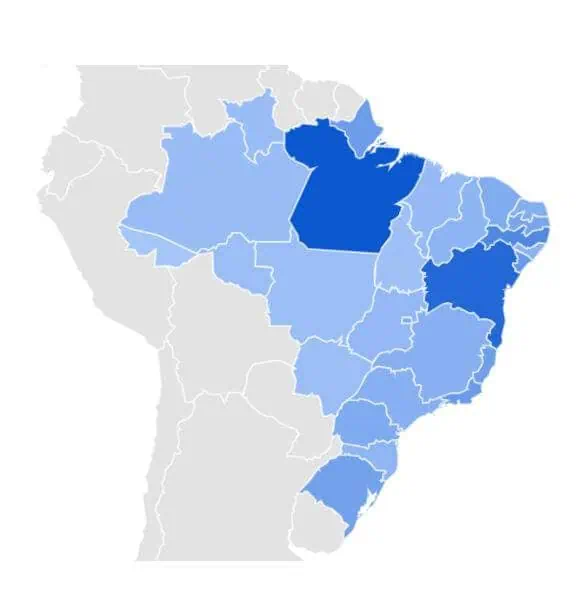
Source: Google Trends
We have also used Google Trends to estimate public interest in legal versions of jogo do bicho online in Brazil over the past 12 months. If regulated iGaming platforms offered legal online casino games that emulated the mechanics of jogo do bicho, would Brazilians choose to play them instead of the illegal lottery?
The analysis suggests that, yes, Brazilians have been increasingly interested in legal jogo do bicho versions at online casinos (yellow) and sports betting platforms (red).

Source: Google Trends
Therefore, it is possible to infer that, during the last 12 months, these Brazilian players not only became more aware of the benefits provided by the online gambling regulation, but also became more interested in playing legal real-money games. After gambling regulation became an issue in mainstream Brazilian media towards the end of 2023, interest became inversely proportional to the general knowledge on the subject.
It is also possible to estimate that the mechanics and aesthetics of the game, as well as its long tradition, are more appealing to these players when coupled with legality.
When it comes to players’ perception of fairness, jogo do bicho is also fourth place among Brazilian active gamblers.
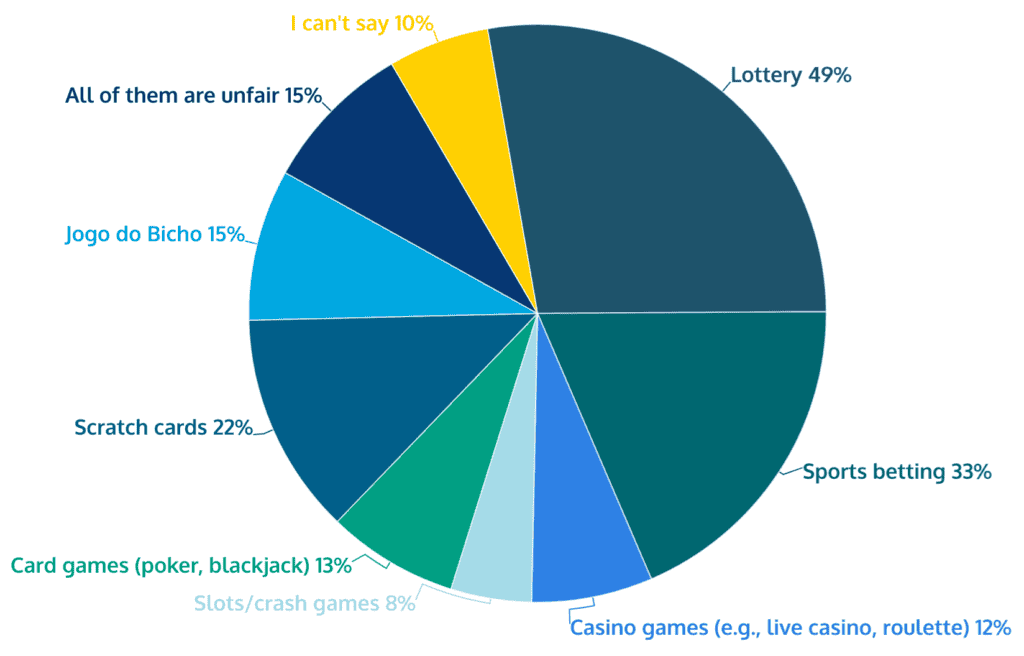
Source: ENV Media, 2024
While online casino and card games are gaining popularity and closing the “trust gap” with jogo do bicho, much of the credibility is undermined by the widespread disinformation on social media. Compared to the lottery and sports betting, the relationship between regulation and trust becomes more apparent.
In addition to the lack of transparency when it comes to secret, unverified draws, jogo do bicho is still considered a criminal misdemeanor with a recent history of extremely violent outcomes. As a result, only 15% of active players consider it fair.
Who plays jogo do bicho?
Today, sports betting is probably the most conspicuous gambling vertical in Brazil. Based on data from a ENV Media survey, 24% of Brazilian online sports bettors also engage with jogo do bicho.
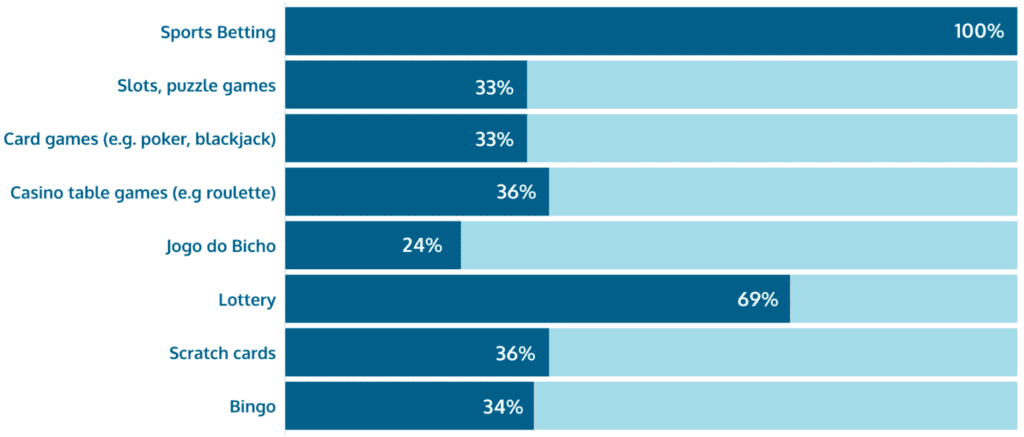
Source: ENV Media, Sports bettors’ knowledge and preferences, 2024
Most sports bettors who admitted to also playing jogo do bicho despite its illegality are female – 54% – while 46% are male. The largest group of players are between 35 to 44 years old – 29,4%.
- 18-24: 26,1%
- 25-34: 23,5%
- 35-44: 29,4%
- 45-54: 5,9%
- 55-64: 11,1%
- 65-72: 3,9%
Rather differently from the past and in line with IBGE’s surveys, when it comes to socioeconomic classes, most jogo do bicho players are middle class, with 46,2% of them in B2 and 25,6% in C1 socioeconomic classes.
- B1: 15,4%
- B2: 46,2%
- C1: 25,6%
- A1: 12,8%
As to geographic distribution, the respondents are more concentrated in São Paulo – 26,92% – and Bahia – 14,74%. Thus, the five states with the largest groups of players are:
- São Paulo: 26,92%
- Bahia: 14,74%
- Rio de Janeiro: 12,18%
- Pernambuco: 7,69%
- Rio Grande do Sul: 5,77%
Therefore, there are three stark contrasts with the results shown by Google Trends, as the searches didn’t include São Paulo, while 3,21% of our respondents live in Pará and 1,28% in Espírito Santo.
The reasons for this are, on the one hand, that our survey was conducted in July, 2024. On the other hand, none of the respondents who admitted to playing jogo do bicho search Google before betting.
Rather, their main sources of information are sports news websites – 18,79% – and social media – 17,03%. In addition, the most commonly used combination of sources is consulting all of them – 15,48%.
- Online sports news: 18,79%
- Social media: 17,03%
- Personal knowledge and intuition: 16,83%
- Experts’ analyzes and tips: 16,83%
- Groups in messaging apps: 15,66%
- Consults with family and friends: 14,87%
On a par with those who look to experts for tips on sports betting online, and especially when it comes to jogo do bicho or the lottery, it is interesting to note that the third largest group of respondents – 16,83% – rely on their own knowledge and intuition.
How to play jogo do bicho?
Originally, when the game was created in 1892, customers bought a jogo do bicho ticket at the Rio de Janeiro Zoo and then received a card with one of 25 different animals. Whoever had the animal card drawn was the winner.
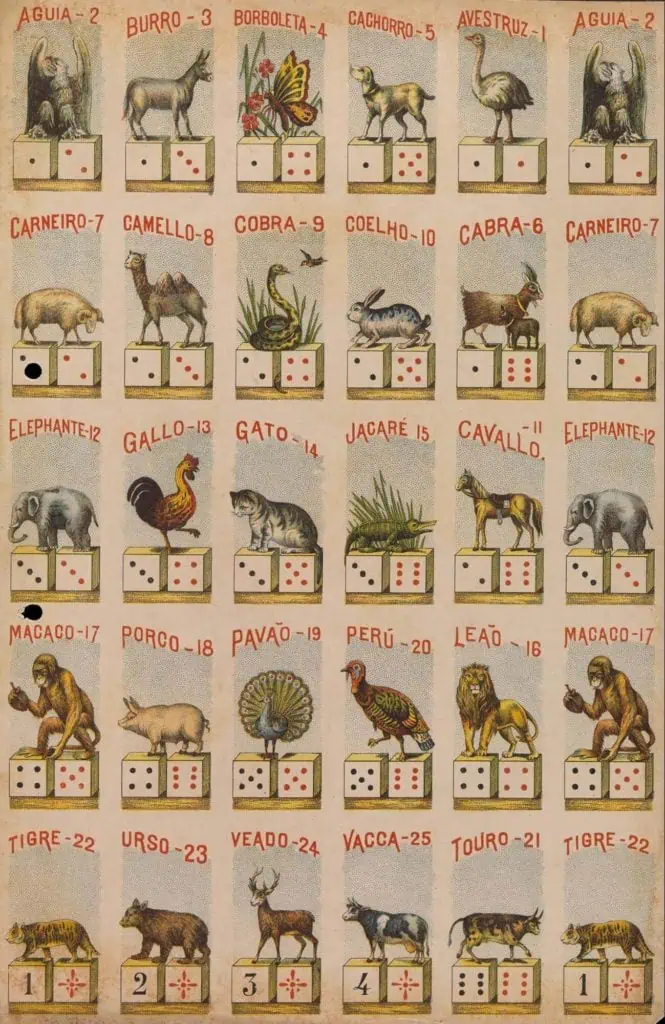
Source: Early twentieth-century jogo do bicho cards, National Library.
However, when it comes to rules, jogo do bicho today works very differently. Each animal corresponds to a group of ten, so the cow – animal number 25 – is the limit with the ten 97, 98, 99 and 00.
Therefore, the player must choose a pair of tens – or animals – among the traditional 25 options. In turn, each pair forms a thousand: the tens 22 and 13 together form the thousand 2213, for example. Every number, thus, is formed by 4 digits.
Typically, at the end of each day, the jogo do bicho results will be announced both physically, like in shell newspaper stands, and online. Several draws are secretly held per day, paying up between 4 and 15 thousand times more the ticket value.
Brief history of jogo do bicho
In the early years of the First Republic, despite its secular nature, gambling was dismissed as an obstacle to progress.
Moreover, as was typical of the nineteenth-century mentality, the association of immorality with the lower classes persisted – an association that extended to the places where they dwelt and socialized.
Therefore, in 1890, the Penal Code signed by Marshal Manuel Deodoro da Fonseca – the first Brazilian president – criminalized all forms of gambling. Except for horse racing, which was coincidentally restricted to the elite.
Two years later, though, in Vila Isabel, a bohemian neighborhood in the city of Rio de Janeiro – then the capital of the country – jogo do bicho was born. It was created by João Batista Viana Drummond – the Baron of Drummond – as a lottery to benefit the city zoo under his administration.
Jogo do bicho was an instant hit. During the Carnival of 1892, people even wrote poetry about it, as the verses in a leaflet handed out by youngsters in the streets of Rio de Janeiro:
Who hasn’t played Jogo do Bicho?
Try it and you’ll see!
You win more money,
Than in all of Amapá
(…) So you see, the jogo do bicho reigns, although the chief baron always cries.
Despite its huge popularity, the zoo lottery only operated for two years. Soon, the Baron wasn’t the only one selling jogo do bicho tickets and thus it was banned by the local authorities in 1894 on the grounds that it was an attempt against family and work.
According to historians, though, jogo do bicho was actually banned because, in the wake of the abolition of slavery in Brazil, it was deemed as a “poor people’s lottery”.
Nevertheless, at that time, jogo do bicho prevailed as just a part of the popular culture that the Brazilian authorities dismissed as lowbrow.
Jogo do bicho in modern Brazil
According to research on the history of jogo do bicho, in Brazil, as in other countries, gambling became popular with the emergence of the consumer society and modern urbanization. For its turn, jogo do bicho in particular laid the foundations for the popular informal economies across Latin America.
A 2021 thesis also shows that, regardless of its prohibition, jogo do bicho grew increasingly popular in the midst of the transition to an industrial economy, which was accompanied by dramatic socioeconomic and structural changes in Rio de Janeiro.
The relationship between jogo do bicho and the law has therefore been complex from the outset, even if at first the persecution was mainly motivated by prejudice.
Thus, a series of laws were passed to tighten the grip on the commercial activities of jogo do bicho also in the early twentieth century.
In September 1917, for example, a major operation against jogo do bicho dealt a severe blow to the bookmakers, but in the end, none of these initiatives were able to stop jogo do bicho.
| Law | Approval | Effect |
|---|---|---|
| 1890 Penal Code, Decree-Law 847, article 367 | October 11, 1890. | Banned unauthorized raffles and lotteries. |
| Rio de Janeiro Municipal Decree of 1895 | January 1, 1895. | Licenses for lottery ticket brokers were tightened and bets on horse races and sporting events were limited to one day a week. |
| Rio de Janeiro Municipal Decree 133/1895 | April 10, 1895. | Prohibited both public and legal gambling within the zoo. |
| Law 428/1896 | December 10, 1896. | Provided fiscalization for illegal lotteries. |
| Law 628/1899 | October 28, 1899. | Amended the Penal Code of 1890, expanding police powers to prevent illegal lotteries. |
| Decree 2,321/1910 | December 30, 1910. | Amended Article 367 of the Penal Code, implicitly mentioning “jogo do bicho”. |
| Decree 21, 143/1932, article 15 | March 21, 1932. | First law to dedicate a specific article to jogo do bicho. |
| Decree 854/1932, article 58 | November 12, 1932. | Established a prison sentence for those involved in jogo do bicho (sellers, middleme, and gamblers) |
| Decree-Law 3,688/1941 | October 3, 1941. | Included gambling as as a criminal offense, prohibiting their exploitation, providing specific exceptions for activities regulated by the government. |
| Decree-Law 9,215/1946 | April 30, 1946 | Banned casinos and annulled existing licenses for games of chance |
Jogo do bicho was even made a non-bailable offense in 1944 by Decree-Law 6,259, but it was during the presidency of General Eurico Gaspar Dutra (1946-1950) that it suffered its most drastic setbacks, as did the entire Brazilian gambling industry.
Decades later, conflicts consolidated the structure of jogo do bicho organizations, and since the 1970s, the strategy of sponsoring samba schools has been crucial to their operation.
As a complex mixture of popular culture and illegality, jogo do bicho was a bearer of both traditional values and modern society.
The professionalization of jogo do bicho
In the 1940s and 1950s, jogo do bicho tickets were sold in small booths. Gradually, this trade evolved into a more organized business, and at some point, the animal lottery was managed from secret headquarters. Meanwhile, the control over jogo do bicho became concentrated in fewer and fewer hands.
Unlike state lotteries, although the activity became more professionalized, the advance of technology has not played a significant role in the dynamics of jogo do bicho. On the other hand, communication devices such as ham radios and telephones were used by bookmakers both to record bets and announce the outcomes of the daily draws.
However, especially in the 1980s, the concentration of the jogo do bicho in the hands of a small number of bosses caused territorial disputes between the parties.
According to an anthropology paper, the security and stability of the jogo do bicho market depends on alliances and interpersonal relationships. These partnerships are instrumental to the control of lucrative territories and the influence of political and economic power in the case of Rio de Janeiro, for example.
Jogo do bicho and Carnival
The relationship between Carnival and jogo do bicho became binding in the 1970s, when the bicheiros (jogo do bicho bosses) began sponsoring samba schools in Rio de Janeiro.
Aware that money alone could not secure influence, the bicheiros of the 1970s strategically decided to finance samba schools in an attempt to win over both the general public and elites.
This move allowed them to embed themselves deeply in Brazilian culture, using Carnaval’s allure to legitimize their presence, swaying societal power structures.
Each one of the main jogo do bicho bosses chose a samba school to support:
- Castor de Andrade: sponsored Mocidade Independente de Padre Miguel and had substantial influence over Bangu’s soccer club.
- Anísio Abraão David: sponsored Beija-Flor de Nilópolis, transforming it into a top competitor. In 1976, Beija-Flor won the Rio de Janeiro championship for the first time in 25 years, with the samba Sonhar com rei, dá leão (if you dream of a king, the outcome will be lion), through which it told the history of jogo do bicho. Today, Abraão David is the honorary president of the samba school.
- Luizinho Drumond: Became a key sponsor of Imperatriz Leopoldinense.
- Ailton Guimarães Jorge (Captain Guimarães) – Affiliated with Unidos de Vila Isabel. He later helped establish the Independent League of Samba Schools (LIESA) in the 1980s.
- Waldermir Garcia (Miro) – sponsored Salgueiro.
This close relationship, based on heavy investments – as well as political and territorial rivalries – inaugurated a phase in Brazilian Carnival in which it was no longer a local cultural expression, but a global phenomenon.
Jogo do bicho and organized crime
On the one hand, the jogo do bicho bosses helped shape the spectacle that has become famous around the world. On the other hand, by the 1990s, carnival had become linked to the parallel power of criminal organizations.
This shift was due to Castor de Andrade’s clandestine importation of electronic slot machines at the time, which greatly increased the boss’s wealth but made the jogo do bicho operations blatantly criminal.
Andrade then delegated the management of the illegal machines distributed in Rio de Janeiro’s bars to his son-in-law, Fernando Iggnácio.
This sparked a war with Castor de Andrade’s nephew, Rogério de Andrade, since the boss died in 1997. Ultimately, Rogério de Andrade was arrested on October 29, 2024, for the assassination of Iggnácio in 2020.
Besides 50 people killed from 1999 to 2007 in the dispute for Castor de Andrade’s legacy, there was another wave of murders that also impacted the late jogo do bicho boss Waldermir Garcia’s family.
Consequently, the debate around the violence connected to jogo do bicho has often raised claims for its legalization.
Online jogo do bicho versions
While the popular nineteenth-century animal lottery remains illegal and somewhat in the shadows, licensed casino and sports betting platforms offer completely legal online jogo do bicho versions.
According to Mangools, a set of SEO tools that measure the frequency of keyword searches, at the beginning of October 2024 there were 7,480 million searches for the keyword jogo do bicho, with a decrease of 18% compared to September.
In the same month, there were 42,200 searches for the term jogo do bicho online, with an increase of 15% over the previous month.
However, it is impossible to determine whether these were searches for legal jogo do bicho games or simply a way to bet on jogo do bicho online, as at least 1,443 illegal betting sites are still up and running, despite the efforts of the National Telecommunications Agency – ANATEL – to shut them down.
The same applies to the query “is online jogo do bicho reliable?“. For the same reasons mentioned above, there is some ambiguity about the actual interest in the reliability of online jogo do bicho, which has also increased in the last 12 months.

Source: Google Trends
Nevertheless, it is relevant to consider the possibility that the 2023 regulation, and all the benefits that it entails in terms of security, fairness and responsibility, could play a significant role in the increased interest in online, legal versions of jogo do bicho.
Where to play jogo do bicho online?
Currently, there are 4 versions of the popular animal lottery available at Brazilian licensed online casinos and sports betting platforms. While three of them mimic the mechanics of betting on either animals or numbers, one is a slot game.
Therefore, among the top 10 regulated casino platforms, six offer online versions of jogo do bicho as follows:
| Brand | Online jogo do bicho |
|---|---|
| Betano | Jogo do Bicho and Jogo do Bicho Bingo by Skywind, and Jogo do Bicho designed by BGaming, which has a free demo available. |
| Bet365 | Jogo do Bicho by BGaming and Jogo do Bicho Zebra Prêmios by SGaming. |
| Betnacional | – |
| Sportingbet | Jogo do Bicho Zebra Prêmios by SGaming. |
| Pixbet | – |
| Betfair | – |
| Novibet | Jogo do Bicho by BGaming; Jogo do Bicho Zebra Prêmios by SGaming; Jogo do Bicho Bingo and Jogo do Bicho by Skywind. |
| KTO | Jogo do Bicho by BGaming. |
| Esportes da Sorte | – |
| Parimatch | Jogo do Bicho by BGaming. Free demo available. |
BGaming’s Jogo do Bicho emulates the mechanics of Bingo, but players can place single, double, triple, quad or quin bets on any of the 25 animals. It is the most elaborate both aesthetically and functionally.
Designed by SGaming, Jogo do Bicho Zebra Prêmios requires players to flip the animal image tiles during their turn. Each turn reveals a new set of animals and the zebra pays the value of all the tiles.
For its part, Skywind has developed two different games that are available in Brazil. They are Jogo do Bicho – a slot game inspired by the traditional animal lottery – and Jogo do Bicho Bingo, which works similarly to the game offered by BGaming. The difference is that players can also bet on tens, hundreds and thousands instead of animals.
Online jogo do bicho bridges popular culture to legality and fairness
Despite the shady public image and criminal ties since its seizure by mobsters in the 1950s, jogo do bicho remains immensely popular across the nation. Possibly because of its association to Carnival and probably because of cultural, traditional and collective imagination of most Brazilians.
While proper legislation is still pending, and especially in light of the advances made by the 2023 regulation of online casino and sports betting platforms, open consideration of legalization is overdue for the beloved animal lottery.
Promoting a safer Brazilian iGaming environment must also be reflected in land-based gambling from a regulatory and legal perspective. Only then can the Brazilian economy benefit from taxes, gamblers be protected, and crime be eradicated.
Meanwhile, legal online jogo do bicho games are growing in popularity, bridging the gap between popular culture, legality and responsible entertainment.

